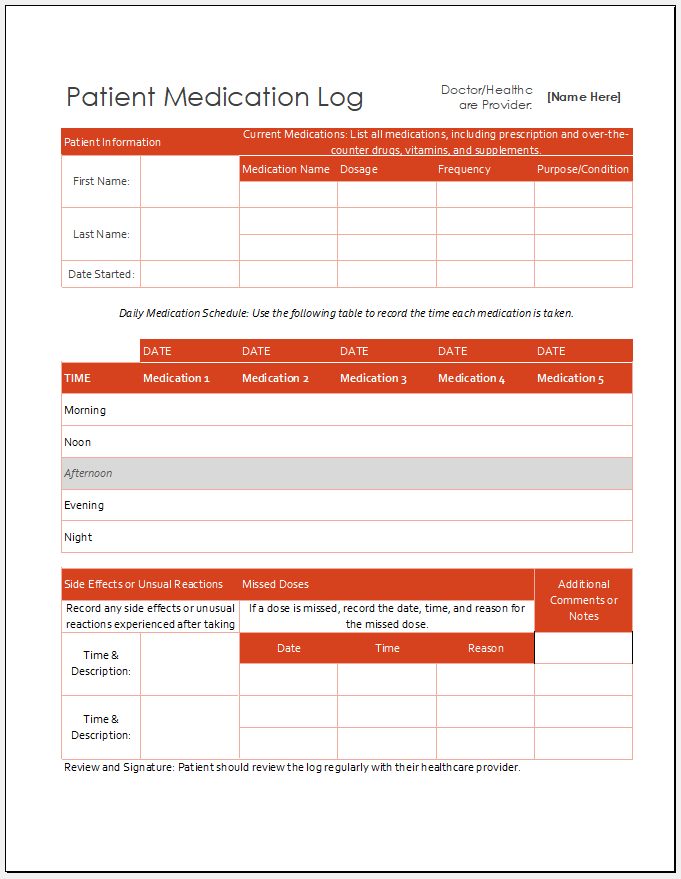Patient Medication Log
A patient medication log, also known as a medication tracker, is a tool that helps patients keep a clear record of their medication intake. Useful information about various medicines, dosage, and frequency is recorded in real-time to ensure safe intake. These logs are maintained either by patients’ caregivers or healthcare providers to keep track of all the medications prescribed.
While taking medicines, it is important to take the correct dosage at the prescribed time to avoid adverse reactions. A healthcare provider decides the dosage and frequency of a particular medicine and depends on the following factors:
- Age
- Gender
- Vitals
- Health status
- Drug based allergies
All these factors are weighed while prescribing medication to ensure safety and avoid unforeseen circumstances.

Patient Medication Log File
Size: 39 KB
Components of the log
The patient medication log provides deep insight regarding their medication and intake. Some of the key components of a medication log are given as follows:
- Patient’s information: name, date of birth, contact information, emergency contact information, and address of the patient are mentioned on the medication log.
- Patient’s history: vitals, previous history of illness or disease, current health status, and drug allergies constitute the history of a patient.
- Medication name: all medicines prescribed to a particular patient are enlisted to ensure that every medicine is accounted for. Healthcare providers mention medicinal formulas, which can have different names depending on their brand.
- Dosage: medicines of varied dosage strengths are available on the market; therefore, it is crucial to mention dosage strengths depending on the patient. High dosage strengths of a medicine can be chronic.
- Frequency: times of medicine intake per day are important to mention, i.e., BID refers to twice a day, whereas QID refers to four times a day.
- Instructions: every medicine has special instructions regarding its intake, which may include its intake of water or milk, avoiding several food items and beverages, etc.
- Healthcare provider: name, designation, contact, and address are mentioned on the medication log.
Benefits of using the log
Patient medication logs, maintained by healthcare providers and patients themselves, have several benefits. Some of these benefits are mentioned below:
- It keeps healthcare providers informed about a particular patient’s prescription and history.
- Adverse reactions to a medicine can be avoided by prescribing personalized medicines.
- Logs maintained by patients help them keep track of their treatment plans and be more informed about their health.
- It allows them to have an open conversation with their healthcare provider and discuss the effectiveness of medicines based on their current condition.
- Issues related to medicine intake can be caught early on, which can help devise a personalized treatment plan.
- It enables patients to take charge of their health by understanding the importance of taking proper medicine at the prescribed time.
- Data regarding medicine intake is easily recorded in an organized manner and can be shared with other medical professionals.
- Patients develop the habit of logging their medicine intake, which keeps them aware of their correct dosage and frequency.
- Medication logs are low maintenance and can be kept with medicine for people to remember to log in every time they take medicines.
Sample Log
A patient medication log is a simple document that helps patients understand their treatment plan; therefore, it does not require software tools or any application to be maintained for a definite period. Usually, medication logs are made for one month, but the period can be adjusted based on the requirements of a particular patient.
A general sample of a patient medication log is provided below,
| Date | Medicine | Dosage | Time | Method of administration |
All the columns are filled while taking a single dose, and this practice continues up to the end of the period. Medication logs can be evaluated for an analysis of the patient’s treatment plan and the indications of adverse reactions to a particular medicine.
Compared to the above-mentioned sample, medication logs can be maintained on electronic devices, i.e., computers or mobile devices, which makes them more accessible and also makes sharing easier. Data can be forwarded easily, which makes electronic gadgets a great tool for maintaining a medication log. Moreover, the software can store data for a longer time and can be easily accessed when required.
- Student Entry & Exit Log
- Gantt Chart for Smaller Projects
- Behavior Log of Child for Schools
- Loan Repayment Tracker
- Product Sales Tracker Template
- Debit Memo Template for Excel
- Winter Attire Inventory
- Financial Projections Worksheet
- Employee Absence Tracker
- Weekly Sales Report Template
- Budget Vs Actual Statement
- Remote Work Attendance Tracker
- Mileage Expense Report Template
- Fitness Calendar Template
- Project Gantt Chart
← Previous Article
Vacation Cost PlannerNext Article →
Tips Calculator